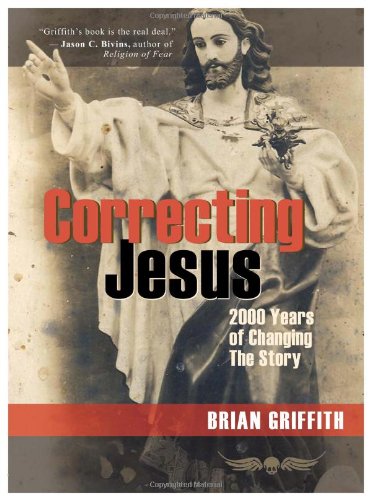John 20:9, The Mystery of the Resurrection
For as yet they knew not the scripture, that he must rise again from the dead.
//In the spirit of mystery–for the resurrection story is a great mystery, whether we claim to know what happened or not–I present today’s verse. I honestly don’t know what to make of it, I’ve never read a convincing commentary on this verse. Maybe I’m allowed to present a mystery on this day of mystery?
The Apostle John arrived at the tomb, peeked in, saw it was empty, and believed. Then today’s verse comes next in the story, explaining why the apostles didn’t automatically believe Jesus had risen. They didn’t “know the scripture” telling them he would rise again.
But where is this found in scripture? How could they have possibly known from scripture alone? Can anybody help?

The Cult of Women, Part II of II
Do we have no right to take along a believing wife, as do also the other apostles, the brothers of the Lord, and Cephas?
//Did yesterday’s post leave you thinking that women were as common as men among the leaders of the early Jesus movement? It’s hard to say. Yet it’s clear that women did serve in much the same roles as men.
I find the references to Jesus sending out evangelists “two by two” very interesting, because it is likely that many of these were male/female pairs. In today’s verse, Paul is speaking about the standards of the apostles, and mentions how their wives would accompany them on their travels. Cephas, by the way, is the apostle Peter.
But were the women ministering, too? Yes, they were. Paul names five of these male-female teaching teams: Prisca and Aquila, Andronicus and Junia, Philologus and Julia, Nereus and his sister, and Peter with his wife. See Romans 16:3-15 for this discussion, where Paul indicates that all were “apostles.”
Bishop Clement of Alexandria (c. 150-215) explains that they traveled as male-female pairs so that the women could speak to women, while the men spoke to other men.
One scholar counted 32 times that the book of Acts uses the terms “brothers and sisters,” where the phrase is used interchangeably with the word “disciples.”
The Cult of Women? Probably not, regardless of early Christianity’s reputation. Merely a cult of equality.

Matthew 27:55, The Cult of Women, Part I of II
And many women were there beholding afar off, which followed Jesus from Galilee, ministering unto him.
//Today’s verse tells how, at Jesus’s crucifixion, it was his female followers who witnessed his death. All of the male disciples had run away. (John’s Gospel tells of the “beloved disciple” standing by, which may have been young John. Perhaps the Roman party felt no threat from a boy.)
It’s interesting to note that Jesus actually had many female followers in his entourage. Luke 8:1-3 tells us of three:
And it came to pass afterward, that he went throughout every city and village, preaching and shewing the glad tidings of the kingdom of God: and the twelve were with him, and certain women, which had been healed of evil spirits and infirmities, Mary called Magdalene, out of whom went seven devils, and Joanna the wife of Chuza Herod’s steward, and Susanna, and many others, which ministered unto him of their substance.
Finally, the Gospels record that it was a woman (or women) who reported the tomb empty and that Jesus had risen. Many scholars have expressed their amazement that this was recorded in the Gospels; after all, the word of a woman in Jesus’s time did not carry the same weight as a man’s.
Is it any wonder Christianity quickly became known as the “Cult of Women?” More tomorrow.

Book review: Correcting Jesus: 2000 Years of Changing the Story
by Brian Griffith
★★★★★
Jesus blew it. He expected too much. A number of his teachings were simply unworkable, and the church found it necessary to rework them over time.
Jesus thought we should treat women as equals, but we corrected that howler in a hurry. He thought maybe God would forgive all those who forgave others, but we quickly realized God isn’t that forgiving. There are many stipulations to His mercy. Jesus suggested we turn the other cheek, but we Americans fixed that one, too. We amassed the biggest military in history, to make sure we never have to play the pacifist like Jesus.
Jesus’s early followers practiced equality, but everybody in our capitalistic country knows what nonsense that is. That man in the gutter, hoping for a handout? He’s there because he’s too lazy to work.
Most of all, we laughed at the way Jesus practiced compassion. Better to throw divorcees, gays, blacks, Muslims, and especially those bleeding heart Liberals under the evangelistic steamroller. We have a conservative agenda to live up to.
This book is a little–no, maybe a lot–more serious than I’m letting on, but it manages to be as entertaining as it is thought-provoking. Highly recommended.
Exterminating Angel Press, © 2009, 326 pages
ISBN: 978-1-935259-02-2

Mark 6:51, Escalating Worship
And he went up unto them into the ship; and the wind ceased: and they were sore amazed in themselves beyond measure, and wondered.
//Mark was the first Gospel written, about 70 CE. Then came Matthew, Luke, and John, probably in that order. When the Gospels are ordered chronologically, it’s much easier to see the evolution of the Gospel story as it grows.
For one thing, his followers are portrayed as more and more worshipful. In Mark, the Twelve are presented as a bit dull, slow to understand, who perhaps never do grasp Jesus’s magnificence.
Today’s verse is an example. Jesus walks on the water, and they’re amazed, unable to grasp what they just saw. The next verse explains that they hardened their hearts, presumably so as not to believe, when Jesus performed the miracle of loaves and fishes.
But now read the same story in Matthew’s Gospel. Suddenly, Peter becomes a quick believer, and asks Jesus to invite him out on the water as well. So Peter walks on water too. Then comes this verse:
And when they were come into the ship, the wind ceased. Then they that were in the ship came and worshipped him, saying, Of a truth thou art the Son of God. –Matthew 14:32-33
Wow! Never in Mark’s Gospel do the Twelve realize Jesus is the Son of God! Evil spirits do, the Centurion does, but not his disciples. Matthew has completely rewritten an important theme of Mark’s Gospel: that of Jesus’s slow-to-understand followers.

Book Excerpt: Revelation: The Way It Happened
I watched as he opened the sixth seal. There was a great earthquake. The sun turned black like sackcloth made of goat hair, the whole moon turned blood red, and the stars in the sky fell to earth, as late figs drop from a fig tree when shaken by a strong wind. The sky receded like a scroll, rolling up, and every mountain and island was removed from its place. –Revelation chapter 6
Cataclysmic events accompany this seal, mimicking the books of Isaiah and Ezekiel. The sun and moon darken, and stars fall from the sky. Isaiah 34:4—All the stars of the heavens will be dissolved and the sky rolled up like a scroll; all the starry host will fall like withered leaves from the vine, like shriveled figs from the fig tree. See also Mark 13:24–27 and the other synoptic Gospels. Picture your “snow globe” universe shaken until the stars fall like figs, and then the empty dome overhead gets rolled up and put away.
This imagery probably evolved from an ancient hymn to the storm god, Baal, describing his advance into combat:
The heavens roll up like a scroll,
And all their hosts languish
As a vine leaf withers
As the fig droops.
Such images may sound bizarre to us today, but they had grown into common symbolism long before Revelation appeared. They denote the final wrapping up of a nation, such as Babylon (as told by Isaiah) and Egypt (by Ezekiel). In this case, the imagery signifies the end of the Jewish state, which would not be restored again for 1,900 years!
–Revelation: The Way It Happened, 2010, pp. 21, by Lee Harmon

Matthew 7:21, Who Enters the Kingdom?
Not every one that saith unto me, Lord, Lord, shall enter into the kingdom of heaven; but he that doeth the will of my Father which is in heaven.
//Sometimes the contradictions in scripture are subtle and other times they are direct. But sometimes they simply highlight the silliness of reading every word as if it were law. Take for example these words from Peter (quoted in Acts 2:21) which contradict what Jesus says in Matthew:
And it shall come to pass, that whosoever shall call on the name of the Lord shall be saved.
Which is it? Does any person who calls on the name of the Lord automatically get saved, or do they have to the do the will of the Father?
I think we know the answer. Peter (in Luke) simply assumes that when a person calls on the Lord, he or she is ready to do the will of God, and the point is that God will not forsake a seeking person.

2 Corinthians 11:32-33, Paul Escapes in a Basket
In Damascus the governor under Aretas the king kept the city of the Damascenes with a garrison, desirous to apprehend me: And through a window in a basket was I let down by the wall, and escaped his hands.
//Luke, when writing about this event in Acts 9:23-25, tells us that the Jews took counsel to kill Paul, and the disciples lowered him in a basket to escape. But Paul’s own letter indicates that he was fleeing the governor under King Aretas, not the Jews.
King? Who is King Aretas?
He was king of the Nabataeans, a southern neighbor of Judea. Aretas wasn’t a Jew; in fact, he fought against the Jews in 4 BCE. His daughter married Herod the Tetrarch. Aretas carried political clout, but did he control Damascus as Paul indicates? That’s unlikely.
So how do we make sense of the different reports? Did Paul escape from Jews, from Nabataeans, from a small Nabataean community in Damascus, or is there some other explanation?
Historians haven’t put this puzzle together yet.

Luke 23:34, Forgiveness of Sins
Then said Jesus, Father, forgive them; for they know not what they do.
//One of the big arguments in the early centuries of the Church was this matter of whether God would forgive. Marcion, for example, felt that the Old Testament God of hatred should be stricken from the Bible. He wanted to pare the Bible down to a few books which portrayed a loving God.
Tertullian violently opposed Marcion and blasted the notions of an all-loving and forgiving God. There is no such God, he insisted, who never grows angry, never inflicts punishment, prepared no fired in hell, does not cause men to gnash their teeth in outer darkness.
But Origen wondered whether even Satan would one day be forgiven. Origen cited Paul’s argument in 1 Corinthians 15:28 that God brought everything into being with love, and in the end all would be restored to love. By implication, God would eventually win even the Devil back to His love.
Demetrius of Alexandria grew so disgusted with Origen’s idea that God would forgive His enemies that he threw Origen out of the Egyptian church.
Everlasting fiery torment seemed to win the day, which brings us to today’s verse. Some copyists of the New Testament began to delete the line from Luke, lest we begin to think our God was a forgiving God.
The debate continues even today.

Book Excerpt: The River of Life
I find that many liberal Christian authors avoid the topic of prayer, not knowing quite how to handle it or explain it, so let me tell you what works for me. I pray not to the creator/Father, nor to God’s incarnational version, the human/Son, but to the third part of the Trinity … that elusive, mysterious Spirit. In the Bible, the Spirit is the carrier of our prayers to God, interceding for us even when we know not how to pray. I find it easiest if I do not try to personify the Spirit. With this focus, I feel silly praying selfish petitions—a universal Spirit somehow transcends my selfish ambitions—so my prayer naturally steers toward renewing my purpose to contribute to the Kingdom of God. The words of the Lord’s Prayer are a perfect utterance, so we’ll talk more about this simple prayer shortly.
I close my eyes in shallow meditation until I feel the Spirit breathing in and around me, like Wind. I breathe God in and out, for breath is merely Wind inside me. Breathing in hope, breathing out love, adding my breath to the Wind, I share in the chorus of the Spirit. Then I open my eyes to see the leaves rustling, the grass bending, the living creation responding.
Your own connection to the Divine will surely differ.

















 354 Circles
354 Circles
 603 Goodreads Friends & Fans
603 Goodreads Friends & Fans

 Hello! I'm an author, historical Jesus scholar, book reviewer, and liberal Christian, which means I appreciate and attempt to exercise the humanitarian teachings of Jesus without getting hung up on any particular supernatural or religious beliefs.
The Bible is a magnificent book that has inspired and spiritually fed generations for thousands of years, and each new century seems to bring a deeper understanding of life’s purpose. This is true of not only Christianity; through the years, our age-old religions are slowly transforming from superstitious rituals into humanitarian philosophies. In short, we are growing up, and I am thrilled to be riding the wave.
I avidly read all thought-provoking religion titles. New authors: I'd love to read and review your book!
Hello! I'm an author, historical Jesus scholar, book reviewer, and liberal Christian, which means I appreciate and attempt to exercise the humanitarian teachings of Jesus without getting hung up on any particular supernatural or religious beliefs.
The Bible is a magnificent book that has inspired and spiritually fed generations for thousands of years, and each new century seems to bring a deeper understanding of life’s purpose. This is true of not only Christianity; through the years, our age-old religions are slowly transforming from superstitious rituals into humanitarian philosophies. In short, we are growing up, and I am thrilled to be riding the wave.
I avidly read all thought-provoking religion titles. New authors: I'd love to read and review your book!
 Hi! While Lee writes the articles and reviews the books, I edit, organize, and maintain the blog. The views expressed here are Lee's but I'm his biggest supporter! :-)
Hi! While Lee writes the articles and reviews the books, I edit, organize, and maintain the blog. The views expressed here are Lee's but I'm his biggest supporter! :-)
Connect With Me!